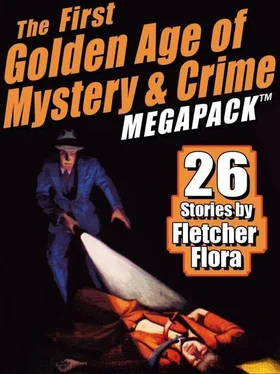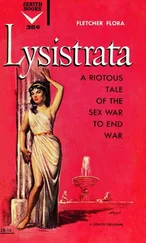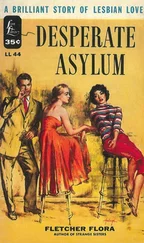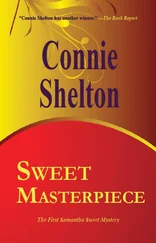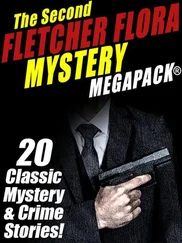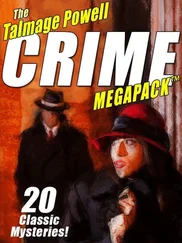Then she began to consider what should go with the roast, and she thought she would have, to start off with, a generous shrimp appetizer. Martin was quite fond of shrimp, and his appetite would surely have been whetted by the complete success of his cruel trick.
Besides, the spicy sauce, with horseradish and all, would disguise the taste of the cyanide that she had discovered, some months ago, tucked away among the gardening supplies in the basement...
The doctor had come, of course, and the doctor had called the police, and the police had been, on the whole, quite considerate. She had spent the night in her own bed, and no one had disturbed her all the next morning. But then, early in the afternoon, a man had called for her with an invitation to come to police headquarters for a little talk, and she had gone with him, for she understood perfectly well that the invitation was really an order.
She now sat in a straight chair in a bare little room, and the only others in the room were a man in a corner with a notebook of some kind and another man whose name was Ryan.
Ryan was sitting on the edge of a desk and he smiled at her; he was young and nice and very friendly.
“Mrs. Sterling,” he said, “there is no good in pretending any longer. You killed your husband, and we know you killed him. Isn’t that so?” She looked up from her hands, which she was holding quietly in her lap.
“Oh, yes. Yes, I killed him. I put poison in his shrimp cocktail. It’s really rather obvious, isn’t it?”
“It is. Did you actually believe you could get away with it?”
“I don’t think so. No, not really. I just thought it would be better to let you make up your own minds.”
“I see. Would you care to tell us why you did it?”
She looked down at her hands again, apparently considering her answer with great care; and when she looked up, Ryan was surprised to see that she was suddenly quite pretty. Color had risen in her cheeks, and her flesh seemed warmed by a kind of inner glow.
“I had a lover,” she said. “I shall never tell you his name, but you will find some letters from him in my room at home.”
Originally published in Ellery Queen’s Mystery Magazine , July 1965.
There is no way better calculated to recall old times and old places than opening the grave of a person you once knew long ago. It was not actually a grave, though. It was merely a niche in the wall of my family mausoleum, which stood aloof and slightly apart within an iron picket fence in the cemetery east of town.
Nor did I do the opening myself. It was done by competent workmen, hired for the purpose with official sanction, while I waited at the open door of the old tomb and looked out across green grass and gray headstones, scoured by a morning rain and now drying in the afternoon sun. I could smell red clover in a nearby field.
When had I come with my mother to bury my father in this old place? It was a long time ago, but a time easily remembered, for there were associations vivid enough and grim enough to have impressed even a ten-year-old boy. It was a time of soup kitchens and doles and idle men. A man named Franklin Delano Roosevelt had just been nominated for the presidency of his country, and in the fall he would be elected.
There was unrest everywhere at that time, and in the midwest there was an extraordinary number of bank robbers, although the banks, unfortunately, were failing fast enough, without help. It was, in brief, 1932, and my father died in August of that year.
The best that can be said of him is that he was a young man. Otherwise, he was sadly deficient in the qualities that make a good husband and father, and my mother’s marriage to him was a mistake she eventually regretted. He had no capacity to earn money or to apply himself for any length of time to constructive work, but his faults were not all negative. He had more than his share on the positive side, and the quality I remember most vividly was his insatiable appetite for bootleg gin. Not that he was ever abusive or brutal; he was merely indifferent to his family responsibilities.
However, my mother and I did not go hungry. In fact, we did not want for anything. Her family had accumulated some money and property in our town, and my memory of the depression was fixed mainly by things that hardly touched me personally. My maternal grandfather had been a prosperous undertaker, and my Uncle Ned had succeeded to his trade and condition. Folk must bury their dead in any time, good or bad, and there is usually a small insurance policy to guarantee payment for services.
Uncle Ned used to complain about the depression and make a great show of pinching pennies, but he gave us a generous allowance every month, and delivered it promptly along with a stereotype lecture to my mother on the foolishness of young girls who married wastrels and drunkards before they were old enough to make sound judgments.
My father died suddenly. He was, as I have said, a young man. To me, of course, he seemed old enough, but I learned later that he was three months younger than the century. I was shielded from most of the unpleasant experiences connected with his death, and he seemed not so much to die as simply to disappear. I was first told that he was sick, and then that he was dead, and the next thing I knew he had been taken to one of the rooms behind the little chapel in Uncle Ned’s establishment, where Uncle Ned, as a concession to my mother’s sensibilities, was giving him individual attention. Before the funeral, I saw the body only once, and that was when, with my mother’s permission and in her company, I was allowed to look at my father in his casket in the chapel.
When he was alive, he had earned scant respect, and now that he was dead, he excited little regret. For that reason, it was decided to make his last rites as simple and unostentatious as possible. The funeral was private, and the casket was kept closed. However, for those who were motivated by more than morbid curiosity to look at my father for the last time, it was arranged to make the body available to the public for an hour on the evening before the day of the burial, and for another hour on the morning of the day.
During these two brief periods his casket lay open in the chapel, and friends could pass by it to the recorded music of an organ. Not many took advantage of the opportunity. In the vestibule of the little chapel there was a registry for visitors to sign, and this was later taken by my mother, who gave it to me, and I have kept it all these years, for some strange reason, and have it still. In it are less than a dozen signatures.
I was not, of course, required to compete with even this small group for a last look at my father. I was taken to the chapel early on the evening before the funeral, and there, with my mother’s hand holding mine and Uncle Ned’s arm around my shoulders, I stood briefly beside the casket.
My father’s face looked quite natural, hardly more drawn and drained than I had often seen it on the morning after a night devoted to a bottle. I could not feel any great sadness or sense of loss, and I was sorry that I couldn’t, and wished that I could. After a while Uncle Ned took me home, told me I was a good boy, and left me with a neighbor woman who had come in to watch over me.
I did not sleep well that night. I was troubled because I had been able to feel so little for my father who was, whatever else he may have been, young and dead and almost friendless. My troubled thoughts nagged me well into the next morning, and finally I decided that I should go, before it was too late, and see him again. The unnatural stiffness of the circumstances, I thought, had dulled my feelings and made it impossible for me to react properly. If I could see him once more, perhaps alone, sorrow might come to ease my guilty conscience. My mother had already left the house, and so it was an easy matter for me to slip away undetected and make my way to the chapel.
Читать дальше
